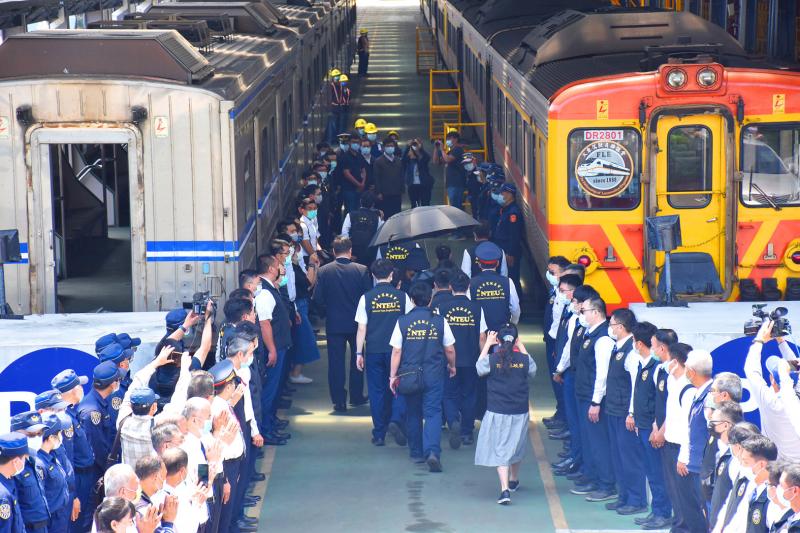The crane truck that caused last week’s fatal train accident had slid onto the tracks about one-and-a-half minutes before it was struck, the Taiwan Transportation Safety Board said yesterday.
The board had launched an investigation into the derailment, which killed 50 people and injured 211 people, making it the nation’s most devastating railway accident in decades.
Carrying 494 passengers and four Taiwan Railways Administration personnel, the southbound express train to Taitung hit the truck as it was about to enter the Cingshuei Tunnel (清水隧道) in Hualien’s Sioulin Township (秀林).

Photo: CNA
The train derailed following the collision, with the left side of the eighth carriage completely destroyed. The seventh carriage was severely deformed and detached from the sixth carriage, the board said.
The fourth, fifth and sixth carriages were twisted as well, it said.
Board investigators tried to reconstruct the accident from data retrieved from the train’s dashcam, an onboard automatic train protection system, train control management system, a vehicle data recorder (VDR) on the crane truck, and footage from surveillance cameras along a nearby highway and other data, board chairman Young Hong-tsu (楊宏智) said.
The crane truck entered the construction site at 8:49am on Friday, carrying a load of used tires, an investigation report said.
VDR data showed that there were other vehicles operating on site, including excavators and motorcycles, the board’s Rail Occurrence Investigation Division convener Li Gang (李綱) said.
The Taiwan Railways Administration said that it had informed contractors that they had to stop all construction work during the Tomb Sweeping Day long weekend.
The board also traced the movement of the crane truck from the VDR data, which showed that it slid down from the top of a slope and was stuck in the bushes when it hit a curve.
The VDR on the truck stopped recording after the truck’s engine was turned off, Li said.
“Based on footage from surveillance cameras and our on-site observation, we infer that the truck fell downhill through a treeless patch on the side of the slope after the engine was turned off and fell on the railroad, with the front of the truck facing the Heren Tunnel (和仁隧道), from which the Taroko Express emerged. A head-on collision ensued about one-and-a-half minutes after the truck flipped over onto the tracks,” Young said.
Asked if the driver left the truck after the engine was turned off, Young said that such information would be disclosed at the discretion of prosecutors.
Dashcam footage from the train showed that the driver could see the truck when the train emerged from the Heren Tunnel.
The train was traveling at 125kph, which means it would have needed 500m to 600m to come to a full stop.
The truck was about 240m from the Heren Tunnel, Young said.
Data from the train control management system showed the train driver and his assistant trying to stop the train by applying the brakes, but they only managed to slow it to 121kph.
The board found that the truck’s brake system was modified as well, Li said.
The board has disclosed about 70 to 80 percent of the evidence gathered on site during the holiday, Young said, adding that it would publish a complete report within four months.

The Central Election Commission has amended election and recall regulations to require elected office candidates to provide proof that they have no Chinese citizenship, a Cabinet report said. The commission on Oct. 29 last year revised the Measures for the Permission of Family-based Residence, Long-term Residence and Settlement of People from the Mainland Area in the Taiwan Area (大陸地區人民在台灣地區依親居留長期居留或定居許可辦法), the Executive Yuan said in a report it submitted to the legislature for review. The revision requires Chinese citizens applying for permanent residency to submit notarial documents showing that they have lost their Chinese household record and have renounced — or have never

A magnitude 5.6 earthquake struck off the coast of Yilan County at 12:37pm today, with clear shaking felt across much of northern Taiwan. There were no immediate reports of damage. The epicenter of the quake was 16.9km east-southeast of Yilan County Hall offshore at a depth of 66.8km, Central Weather Administration (CWA) data showed. The maximum intensity registered at a 4 in Yilan County’s Nanao Township (南澳) on Taiwan’s seven-tier scale. Other parts of Yilan, as well as certain areas of Hualien County, Taipei, New Taipei City, Taoyuan, Hsinchu County, Taichung and Miaoli County, recorded intensities of 3. Residents of Yilan County and Taipei received

Taiwan has secured another breakthrough in fruit exports, with jujubes, dragon fruit and lychees approved for shipment to the EU, the Ministry of Agriculture said yesterday. The Animal and Plant Health Inspection Agency on Thursday received formal notification of the approval from the EU, the ministry said, adding that the decision was expected to expand Taiwanese fruit producers’ access to high-end European markets. Taiwan exported 126 tonnes of lychees last year, valued at US$1.48 million, with Japan accounting for 102 tonnes. Other export destinations included New Zealand, Hong Kong, the US and Australia, ministry data showed. Jujube exports totaled 103 tonnes, valued at

BIG SPENDERS: Foreign investors bought the most Taiwan equities since 2005, signaling confidence that an AI boom would continue to benefit chipmakers Taiwan Semiconductor Manufacturing Co’s (TSMC, 台積電) market capitalization swelled to US$2 trillion for the first time following a 4.25 percent rally in its American depositary receipts (ADR) overnight, putting the world’s biggest contract chipmaker sixth on the list of the world’s biggest companies by market capitalization, just behind Amazon.com Inc. The site CompaniesMarketcap.com ranked TSMC ahead of Saudi Aramco and Meta Platforms Inc. The Taiwanese company’s ADRs on Tuesday surged to US$385.75 on the New York Stock Exchange, as strong demand for artificial intelligence (AI) applications led to chip supply constraints and boost revenue growth to record-breaking levels. Each TSMC ADR represents